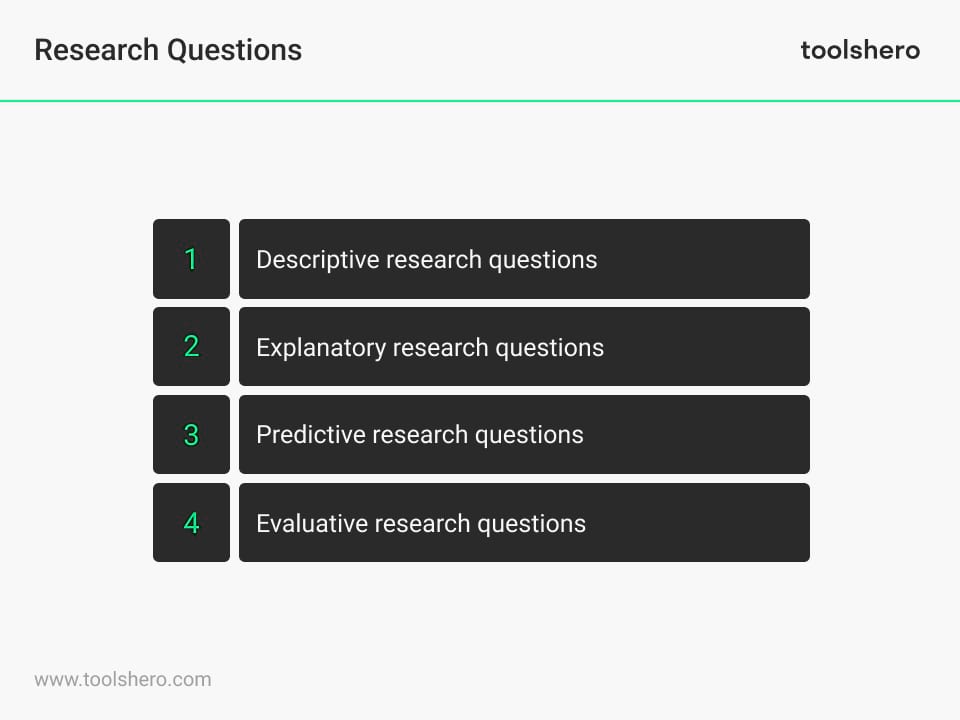Research questions explained plus examples

Research questions: This article provides a practical explanation of the topic of research questions. The article begins with a general definition of the term “research question” and an explanation of the different types of research questions. You will also find several useful tips for developing your own research question and sub-questions, for example, for a thesis or other research project. Enjoy reading!
What is a research question?
When conducting research, the research question and sub-questions are essential. The research question reflects the main question of the research, and the sub-questions contribute to answering this main question. Therefore, it is essential to carefully consider the formulation of the questions.
A good research question is concrete, relevant, and well-defined. It should be clear what is being researched and what the purpose of the research is. The sub-questions should match this and should be specific enough to be answered within the research. The sub-questions should also contribute to answering the main question.
Example research question
An example of a research question with sub-questions could be: “How can communication between employees and managers be improved within organization X?” The sub-questions could be:
- What does the current communication structure look like within organization X?
- What are the obstacles to communication between employees and managers?
- What communication tools are currently used, and are they effective?
- What are the best practices for improving communication between employees and managers?
Creating good research questions and sub-questions is important for carrying out a clear and relevant study. By paying sufficient attention to this, the research can be carried out efficiently and effectively, and valuable results can be achieved.
Common types of research questions
There are different types of research questions used in research, depending on the purpose of the research and the nature of the research question. Below are some common types of research questions explained.

Figure 1 – 4 types of Research questions
1. Descriptive research questions
These questions focus on describing a phenomenon, situation, or population. They are aimed at gathering information about what is going on and what is known about the research topic. An example of a descriptive research question is: “What percentage of students at university X have a part-time job alongside their studies?”
2. Explanatory research questions
These questions focus on finding explanations for a particular phenomenon or situation. They aim to find causal relationships between different variables. An example of an explanatory research question is: “What is the relationship between stress and sleep deprivation among healthcare workers?”
3. Predictive research questions
These questions focus on predicting future events or outcomes based on certain variables or factors. They aim to find patterns and trends that can help make predictions. An example of a predictive research question is: “How much is the sales of product X expected to increase in the coming year?”
4. Evaluative research questions
These questions focus on evaluating the effectiveness or efficiency of a particular intervention, policy, or program. They aim to assess the impact of a particular action or change. An example of an evaluative research question is: “What is the effect of introducing a new teaching method on the academic performance of students?”
It is important to choose the right type of research question that fits the purpose of the research and the research method used. By formulating a clear and specific research question, a researcher can work more effectively and achieve the desired results.
Research Methods For Business Students Course
A-Z guide to writing a rockstar Research Paper with a bulletproof Research Methodology!
What criteria should a good research question meet?
Below you will find six criteria that a good research question should meet. These criteria are specificity, clarity, relevance, feasibility, significance, and interest.
Specific
The research question must be formulated clearly and specifically, so that it is clear what the subject of the research is.
Relevant
The research question must be relevant to the field and build upon existing knowledge and insights.
Feasible
The research question must be feasible within the available time, resources, and knowledge of the researcher.
Verifiable
The research question must be verifiable through empirical research or data analysis, so that the results can be objectively evaluated.
Original
The research question must be original and contribute to expanding existing knowledge or developing new insights.
Inspiring
The research question must be challenging and inspiring, so that it motivates the researcher to work hard and perform at a high level.
How to write a good research question?
With the following steps, you can formulate a good research question that is relevant to the field in which you are conducting research.
Step 1: choose a topic
Choose a topic that is relevant to your field and contains keywords that people search for. Use a tool such as Google Keyword Planner to find keywords.
Step 2: prepare
Read literature and articles about the topic and identify gaps in knowledge or conflicting results that are worth further investigation.
Step 3: develop a preliminary research question
Formulate a general preliminary research question based on the findings from the literature. Make sure that this question is clear, concise, and relevant. Use relevant terms in your question.
Step 4: refine
Refine the general question into a specific question that can be answered through empirical research or data analysis. Use clear and simple language, and avoid jargon.
Step 5: check
Check if the question meets the characteristics of a good research question: is the question specific, relevant, feasible, verifiable, original, and inspiring?
Other tips for developing a research question for your thesis
Developing a good research question is essential for a successful thesis. Here are some tips that can help you develop a research question:
Choose a relevant topic
Choose a topic that is relevant to your field of study and that you are passionate about. This will increase your motivation and help you make a meaningful contribution to your field.
Determine the purpose of your research
Ask yourself what you want to achieve with your research. Do you want to discover a new problem, solve an existing problem, or introduce a new concept? Be specific Make sure that your research question is specific and not too broad. It should have a clear purpose and focus on a limited topic.
Use clear language
Make sure that your research question is clear and understandable to others. Avoid jargon and technical terms, unless they are necessary for the context of your research.
Make it measurable
Ensure that your research question is measurable, so that you can evaluate and analyze the results of your research.
Consider data availability
Check if there is enough data available to answer your research question. If there is no relevant data available, it may be necessary to modify your research question.
By keeping these tips in mind, you can develop a research question that is relevant, specific, and measurable, and that contributes to your field of study.
Now it’s your turn
What do you think? Do you recognize the explanation about research questions? Have you often worked with research questions? Like during the process of writing your thesis or another type of research? Do you find the tips and recommendations in this article helpful? Do you have other tips or comments?
Share your experience and knowledge in the comments box below.
More information
- Agee, J. (2009). Developing qualitative research questions: A reflective process. International journal of qualitative studies in education, 22(4), 431-447.
- Andrews, R. (2003). Research questions. Bloomsbury Publishing.
- Barick, R. (2021). Research Methods For Business Students. Retrieved 02/16/2024 from Udemy.
- Dillon, J. T. (1984). The classification of research questions. Review of Educational Research, 54(3), 327-361.
- White, P. (2017). Developing research questions. Bloomsbury Publishing.
How to cite this article:
Janse, B. (2023). Research questions. Retrieved [insert date] from Toolshero: https://www.toolshero.com/research/research-questions/
Original publication date: 05/12/2023 | Last update: 01/02/2024
Add a link to this page on your website:
<a href=”https://www.toolshero.com/research/research-questions/”>Toolshero: Research questions</a>












